
We speak to Wole Soyinka, the 91-year-old celebrated Nigerian writer and first African Nobel laureate, who recently had his U.S. visa revoked after he made comments critical of Trump. As Trump threatens U.S. military action against Nigeria over claims of a “Christian genocide” in the country, Soyinka says, “when religious differences began to be invoked as a means of political power, and even social and economic powers, we’ve had unquestionably the issue of impunity.” By “expanding the force of hostility,” he adds, “Trump is not making things easy for there to be a resolution.”
Transcript
AMY GOODMAN: We turn to Wole Soyinka, the acclaimed playwright, author and poet, the first African to win the Nobel Prize for Literature. You teach at NYU Abu Dhabi. You’re not in the United States. And looks like you can’t come here because the Trump administration has revoked your visa. Can you start off by responding to President Trump saying that they’re going to strike Nigeria, guns blazing?
WOLE SOYINKA: Could you repeat what Trump was alleged to have said? I missed the latter part.
AMY GOODMAN: Trump said, in a social media quote, that he could attack Nigeria, guns blazing, to save Christians in Nigeria. Interestingly, Professor Soyinka, you were raised as a Christian, and now you’ve been denied your visa. Can you respond to him saying he’s cutting off aid to Nigeria and could strike Nigeria?
WOLE SOYINKA: Yes, guns blazing. And the word “vicious,” I think, even appeared in either that statement or another —
AMY GOODMAN: Yes.
WOLE SOYINKA: — that the war will be vicious, etc., etc.
Let me begin by just stating my conviction that we must separate the problems which Nigeria has, and has had for decades, separate that from President Trump’s response, recent response. The Christian-Islam, or Islam versus the rest, or even Christianity versus the rest, that kind of a dichotomy has existed, as I said, for quite a few decades. It’s escalated. It’s become truly horrendous in many aspects since politics got mixed up with religious differences. In other words, when religious differences began to be invoked as a means of political power, and even social and economic powers, we’ve had unquestionably the issue of impunity.
In other words, it’s — if we identify, for instance, certain extreme groups in one religion, and the perpetrators of these horrors get away with it openly — and I’m going to illustrate. There was a girl, a student, who was brutally lynched, really savaged and dehumanized before being killed. I wrote a play about it. I was so exercised by it, I wrote a play, which I — which was produced, in fact, in my department in Abu Dhabi. And the allegation was that she blasphemed against the Prophet Muhammad, which she did not, by the way. I mean, that’s proven. Right, that’s bad enough. It’s just excruciating enough. But when it is followed by the perpetrators, who were charged to court, who were eventually acquitted, or at least the charges dismissed, when it gets to the level where such perpetrators go on internet displaying a box of matches and saying — I quote — “This is the box of matches with which I killed. I was the one who set fire to her,” and nothing happens to them, and they walk free.
Now, it is those kinds of incident which escalates in popular perception that there is a brutal war going on between Christians and Muslims, whereas, in truth, we’re dealing with extremists. We’re dealing with political Islamists, known sometimes as ISWAP across West Africa or Boko Haram within Nigeria. These are the real enemies of society, not Islam as such, not followers of Islam, the Muslims as such. It’s the political Islamist extremists, the psychopaths. Unfortunately, they’ve allied with similar movements outside Nigeria, and so they have a steady supply of arms. I mean, they carry arms so sophisticated that sometimes the military cannot subdue them. Then, you’ve had, frankly, let’s be honest, some very lackadaisical leaders in the direction of curtailing, just curbing, this monstrosity of fundamentalism, of homicidal fundamentalism. We have groups, very well armed, who swoop on villages, and they cite fidelity to Islam. Now, these are the real enemies, not Muslims.
And so, when we have sweeping statements like that of Trump, it’s not making things easy for there to be a resolution, because it’s expanding the zones, the regions of hostility, expanding them to an extent, but it becomes almost invisible.
AMY GOODMAN: Wole Soyinka, we only have a minute, and I did want to repeat, since it’s so important, his quote: “If we attack, it will be fast, vicious, and sweet,” is what he said. But I wanted to ask you, in this last 30 seconds, why your visa was revoked to the United States.
WOLE SOYINKA: Oh, I have a feeling that I haven’t been saying, I haven’t been flattering Donald Trump, and I see no reason to do that. And there have been occasions when I’ve had to speak up quite bluntly. There was a recent —
AMY GOODMAN: You compared him to Idi Amin of Uganda?
WOLE SOYINKA: Yes, yes. Oh, I think Trump should be flattered by the fact that I compared him to Idi Amin. I mean, Trump has said he likes war. I mean, I’m quoting him. Idi Amin was a man of war and brutality. Idi Amin considered himself a liberator. He called himself the “last king of Scotland.” He was going to liberate Scotland from the British.
AMY GOODMAN: Wole Soyinka, we have to wrap.
WOLE SOYINKA: Trump also considers himself as —
AMY GOODMAN: But I’m going to ask you to stay with us, because we’re going to do Part 2 of this discussion at democracynow.org. People can check it out. Wole Soyinka, Nigerian Nobel Prize-winning author. That does it for our show.

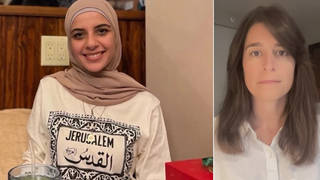
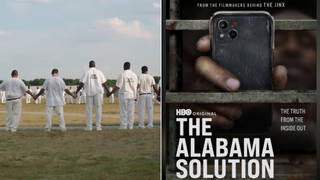
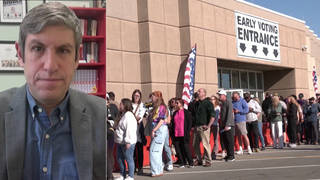
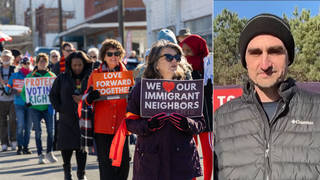






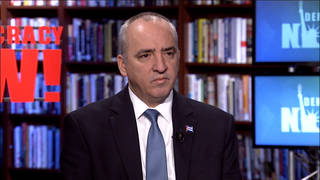
Media Options